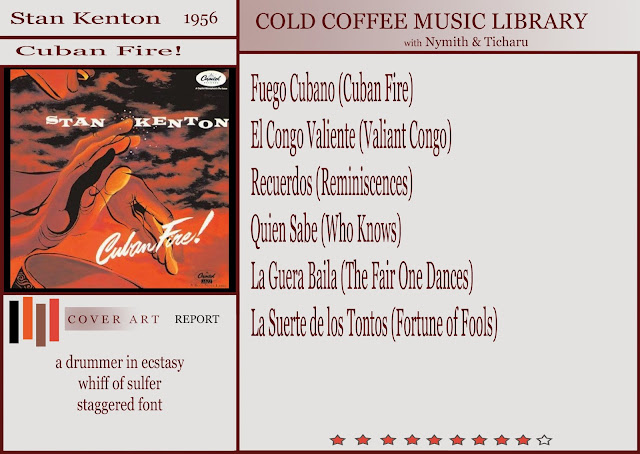Friday 22 May 2015
Cuban Fire
WHAT NYMITH SAYS
Here is one of those albums where the first track is completely diagnostic - if you like it, the rest of the album is similar, no surprises. However, the basic sound of the album is deliriously weird. Often thought of as Stan Kenton's peak, Cuban Fire finds him backing away from the relative restraint and viability of New Concepts of Artistry in Rhythm, taking 'Taboo' from that session as his blueprint for the next move - to combine the sweep of an orchestra and the intimacy of Latin rhythms. Can it be done? Yes, and to remarkable effect. No compromises here, my friend. This is right up there with Mingus and Hamilton as the most unusual and ambitious jazz of the year (and what a great year for jazz it was).
Here's a walk-through of 'Fuego Cubano (Cuban Fire).' It starts with a blaring horn section (if you're allergic to brass bombast, stay away from this record and all of Kenton's other work as well) no sooner grabbing you before subsiding into Holstian darkness. I am reminded of film scores as it soon rises into a climactic action soundtrack - picture your favourite Harryhausen monsters in an epic battle, the loser tumbling down the cliff into the sea and you will find this movement entirely complimentary. Where Kenton deviates from a classic, if complicated, theatrical style is when the "battle" subsides and a swaying Latin motif takes over, "introducing Rita Hayworth" if you will. It's bizarre, unlike anything I've heard and though the mixture is unpredictable in mood and style, it meshes perfectly. Kenton made a creative leap with this album and pulled it off.
Next up is 'El Congo Valiente,' with a heroic motif fit for a Stewart Granger pic and red-hot percussion, followed by the overt romanticism and passion of 'Recuerdos (Reminiscences). Three dynamic variations on the same ingredients form the first half of Cuban Fire and it is a remarkable performance. Intense, riveting, complicated jazz forged out of soundtrack bombast and Cuban rhythms. This alone guarantees it a "must-hear" recommendation.
The only problem is that the second half of the album sounds about the same. No new moods are presented, making for a trio of songs to round out the album rather than a dynamic set in their own right. 'Quien Sabe' returns to the boiling energy of 'El Congo Valiente,' 'La Guera Baila' is another romantic variation and the finale, 'La Suerte de los Tontos,' is the heroic finish. There are no surprises after you've heard the first half and that strikes me as disappointing.
However, it remains a strong record and though the average record buyer of 1956 preferred their "south of the border" sensations to come from the family friendly Harry Belafonte rather than the avant-garde Stan Kenton, this is a great musical achievement that fulfills Kenton's promise of "new concepts." Recommended.
WHAT TICHARU SAYS
This record makes me wonder what Stan Kenton would do in 2015. He meshed genres in a rather spectacular way, brash, dissonant one minute and then lush and beautiful. Latin, classical, big band, mad percussion, huge horn blasts. It's weird, yeah but it hangs together. Listening to this insane record 60 years later, I'm in awe for one thing, the amount of work that went into it, phenomenal. No samples, no cut and paste, no choice but to re-do the entire take if the trombone played B flat instead of A in measure 186! And maybe dock his pay...
Notice how short the record is? Fidelity is hard to achieve with a Stan Kenton record. I envy anyone who got to see this stuff live. They heard it as it was meant to be. That's the other thing about Stan Kenton records, they are certainly elitist, musically and sonically. You need a head for music to appreciate what they were doing with these arrangements and you need some great gear to even come close with the reproduction.
The glory of the modern world is that anyone (pretty much) can at least get a taste of what has gone before. From classical music to the jazz greats, blues players, old time country and folk, it's all there. If you're of a mind you can explore music like no other time in history. Stan Kenton was a champion of big band, at one time a very popular form of music, here it is at the end of its run and about as complicated as it ever got. Open your ears, dive in to the deep end of the pool!
Subscribe to:
Post Comments (Atom)


No comments:
Post a Comment